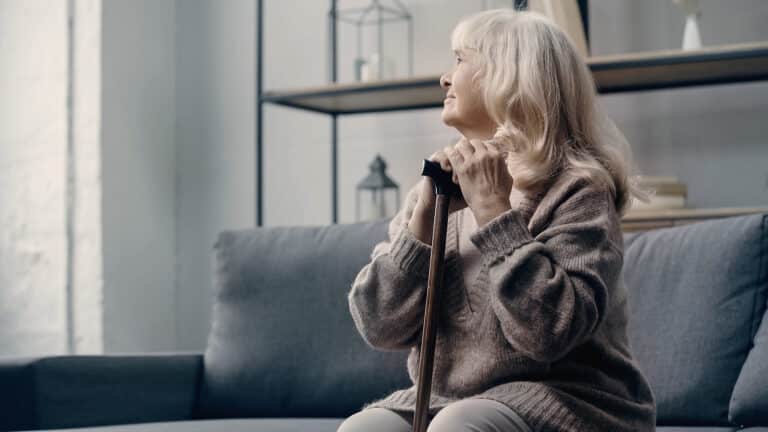
Unfortunately, the impact of loneliness goes beyond mere emotional distress and can have severe consequences for seniors’ overall health. Here are some ways in which loneliness can impact senior health:
Poor Mental Health
Loneliness can cause mental health problems in seniors. When seniors aren’t getting enough social contact or feel isolated they can feel sad, withdrawn, or like no one cares about them. Often seniors who are socially isolated experience symptoms of depression and anxiety. They may also develop generalized anxiety disorder. such as depression and anxiety.
Cognitive Decline
Studies have shown that loneliness and social isolation can accelerate cognitive decline. And it can increase the risk of developing conditions such as dementia and Alzheimer’s disease. A lack of social stimulation and intellectual engagement negatively impact brain health and cognitive functioning in seniors.
Physical Health Issues
Loneliness has been linked to a range of physical health problems in seniors. Chronic loneliness can weaken the immune system. It also can increase a senior’s risk of heart disease, high blood pressure, diabetes, and a range of other health problems.
Sleep Disorders:
Loneliness can cause insomnia or make sleep disorders worse for seniors. When seniors aren’t getting enough quality sleep they can experience mood shifts, irritability, and depression. Anxiety is often worse when seniors aren’t getting enough rest.
Ignoring Self-Care
Seniors that are lonely may stop taking care of themselves. They could stop taking their medication which would lead to poor health. Or they may stop showering, getting dressed, and physically taking care of themselves.
If seniors are lonely they may also try to cope with their loneliness by eating too much, drinking alcohol, or smoking.
Increased Stress
Chronic loneliness can also cause high levels of stress. When seniors are stressed out their bodies produce the hormone cortisol. Too much cortisol can increase the risk of hypertension, cardiovascular disease, and compromised immune function.
Seniors that are at risk for becoming socially isolated do have some options. Seniors that are lonely or wanting to have a reason to get out of the house and socialize should try:
- Volunteering in local community groups or with national organizations. Volunteering is a great way for seniors to find purpose and social connection.
- Getting involved in clubs and groups locally. The local senior center is a great resource for seniors where they can make new friends and explore new hobbies.
- Companion care at home gives seniors the social contact they need in the comfort of their homes. Companion care at home is a big help to seniors who find it difficult to go out.
Seniors that are aging in place can avoid loneliness and improve their quality of life by adding more friends, being more social, and finding a way to share their skills and talents.
If you or an aging loved one are considering hiring companion care at home in Greer, SC, contact Heart of the Carolinas Home Care at 864-991-3116. Providing Home Care Services in Greenville, Simpsonville, Greer, Anderson, Spartanburg, Mauldin, Seneca, Laurens, Charleston, Columbia and the surrounding area.
Source 1 / Source 2 / Source 3
- Is it Possible to Prevent Family Caregiver Burnout? - April 25, 2025
- Home Care Assistance Helps Seniors After A Fall - April 9, 2025
- How Home Care Supports Seniors Who Are Hard of Hearing - March 28, 2025

